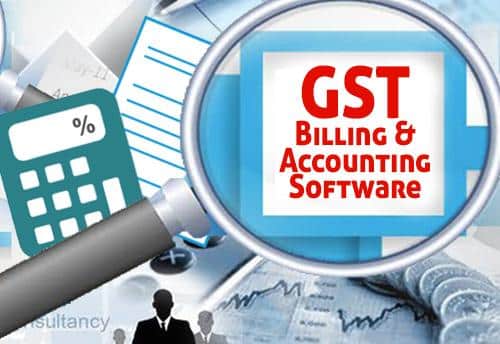What is GST and Why is it Important for Businesses?
GST, or Goods and Services Tax, is a tax system based on consumption that is imposed on the exchange of goods and services in numerous countries. It has supplanted various indirect taxes, including sales tax and value-added tax (VAT), by introducing a unified tax system. GST simplifies the taxation process by eliminating the compounding effect of taxes, thereby easing the burden of tax compliance for businesses.
In the Indian context, GST is a consumption-based tax that covers the supply of both goods and services. This tax system combines and replaces existing indirect taxes including VAT, excise duty, and service tax. GST is calculated based on the value added at each stage of the supply chain, meaning that the tax is assessed only on the value added at each step, rather than on the cumulative value of the goods or services.
Role of GST software in aiding businesses
GST software is a valuable and modern solution that automates various GST-related tasks, such as generating GST invoices, calculating GST rates and taxes, facilitating GST return filing, and tracking GST payments and refunds. What sets GST software apart is its ability to help businesses avoid common GST filing errors by validating data before submission to the GST authorities and providing real-time feedback to identify potential errors. Moreover, GST software uses technology to simplify tax computations, efficiently handle Input Tax Credit (ITC), create invoices compliant with GST requirements, and guarantee punctual and precise return submissions. This GST return filing software provides real-time visibility into the business’s GST compliance status and helps businesses stay compliant with the changing GST regulations.
By using GST software, businesses can save time and money while ensuring strict compliance with GST regulations. This is particularly important for businesses navigating the complexities of GST Return Filing and GST Return Online. Small businesses, in particular, benefit from adopting accounting software for small businesses, which streamlines the management of GST-related tasks efficiently and with a reduced risk of errors.
Challenges of Managing GST Manually
Although GST has streamlined the tax system, managing it manually can be complex and time-consuming for businesses. Here are some of the most typical issues that organizations deal with while manually administering GST;
1. Complex Tax Calculations: GST involves different tax rates and exceptions depending on the type of goods or services and where the buyer and seller are located. Keeping track of these rates and exceptions manually can be difficult and prone to errors. Businesses may struggle to accurately calculate the GST amount to be collected or paid, leading to potential compliance issues.
2. Input Tax Credit (ITC) Management: Businesses must keep detailed records of all their purchases and costs in order to claim Input Tax Credit (ITC) under GST. Managing ITC manually involves meticulous record-keeping and matching of invoices, which can be time-consuming and prone to errors. Failure to correctly claim ITC may result in a larger tax burden for the business.
3. Compliance Requirements: GST mandates businesses to file regular returns, generate invoices with specific details, and adhere to various legal requirements. Managing these compliance requirements manually can be overwhelming, particularly for small and medium-sized enterprises (SMEs) with limited resources. Missing deadlines or making errors in return filing can result in penalties and legal difficulties.
4. Lack of Real-time Visibility: Managing GST manually may not provide real-time visibility into the financial health of the business. Businesses may struggle to track their GST liabilities, pending refunds, and overall GST compliance status. This lack of real-time insight can hinder decision-making and financial planning.
Don’t Miss : GST Calculator
Benefits of GST Software
GST software can provide various benefits to businesses, including;
1. Increased Accuracy: By automating tax calculations, GST software greatly reduces the chances of errors. This automation ensures precise compliance with GST regulations, minimizing the risk of incorrect filings. Additionally, it efficiently manages Input Tax Credit (ITC), mitigating the chances of missing out on eligible credits.
2. Time-saving: GST software streamlines various GST-related tasks, such as the generation of GST-compliant invoices, return preparation, and ITC reconciliation. By automating these processes, businesses save valuable time, allowing them to redirect their focus and resources towards their core operations.
3. Compliance Management: GST software helps businesses adhere to GST regulations. It automates the production of GST-compliant invoices, return preparation and filing, and ITC administration. Moreover, it keeps businesses updated with the latest changes in GST laws, ensuring that they maintain timely and accurate compliance.
4. Real-time Visibility: One of the key benefits of GST software is its provision of real-time visibility into a business’s GST-related aspects. This includes tracking GST liabilities, pending refunds, and the overall compliance status. With this real-time insight, businesses can make well-informed decisions and maintain a clear understanding of their GST position at all times.
5. Scalability: GST software is highly scalable, capable of accommodating the GST compliance needs of businesses of all sizes, ranging from small startups to large enterprises. It possesses the flexibility to adapt to evolving business requirements and grow alongside the business, ensuring that it remains effective and efficient regardless of the business’s size or complexity.
Conclusion
GST software stands as a fundamental asset for businesses negotiating the complexities of the GST filing procedure. By automating tax calculations, minimizing errors, and providing real-time insights, it enables businesses to maintain optimal financial health and stay compliant with ever-evolving GST regulations. Furthermore, the scalability of this software ensures that it can cater to businesses of all sizes. As the business environment becomes increasingly dynamic, the adoption of GST software becomes not only a strategic choice but a necessity for maintaining financial stability and regulatory compliance.
